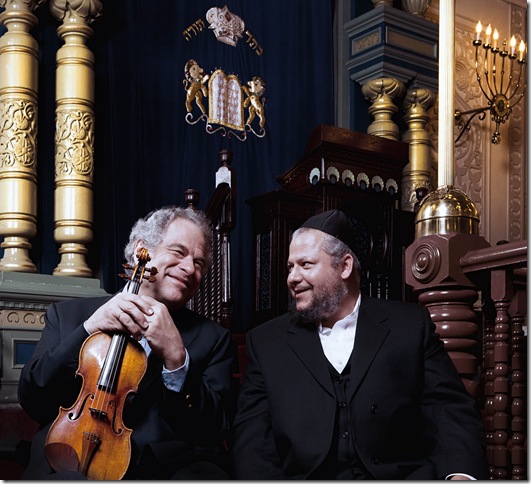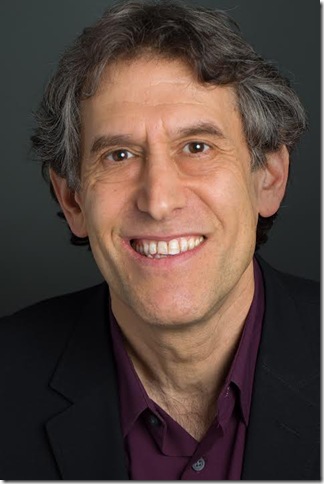It’s a 1950s Saturday in Tel Aviv, in the fledgling state of Israel, and the radio’s playing cantorial music, as it always does on Saturdays.
It’s music that sticks with one person in particular, a young, prodigiously talented young violinist who will soon make his mark in the world as a teenage phenomenon. But through all the decades and accolades that followed, Itzhak Perlman never forgot the music he heard in those years.
“They would play these old cantorial records over and over again, and he became an authority on them,” said Hankus Netsky, a New England Conservatory of Music professor and longtime Perlman collaborator. “And Itzhak, like me, had this view: What was wrong with that music? It was really powerful, it was unique, it was really artistic, it was very complex. It had taken 1,000 years for it to get where it was, and so why not go back to it?
“Go back to some sources that have been almost forgotten — the cantorial recordings of (Yossele) Rosenblatt, for example — and get that music out there,” Netsky said. “It’s a great artistic tradition for everyone, not just the Jewish community.”
Perlman will get a chance to demonstrate that at this year’s Festival of the Arts Boca, when he’ll be joined by Cantor Yitzchak Meir Helfgot of New York’s Park Avenue East Synagogue for a concert March 9 called Eternal Echoes: Songs and Dances for the Soul, based on Perlman and Helfgot’s album of the same name, released in 2012.
Three days before that, Perlman will be the soloist in the Mendelssohn Violin Concerto with the festival’s house orchestra, the Festival Orchestra Boca, under Constantine Kitsopoulos. That music, too, has a strong Jewish connection. Felix Mendelssohn, although he was raised as a Christian after his assimilative father decided to convert, was a member of an eminent German Jewish family. His grandfather, Moses Mendelssohn, sometimes considered the father of Reform Judaism, was a leading Enlightenment intellectual in the late 18th century.
Perlman’s deep interest in what he has called “Jewish comfort music” led him to this project, but Netsky said neither he nor the violinist were interested in recreating the big, full Romantic orchestra arrangements that accompanied a certain kind of cantorial record in the later 20th century, such as the popular recordings by opera singers Richard Tucker and Jan Peerce.
“That was not the style Perlman wanted on this project. Recordings with a very large orchestra, grandiose to the point of being bombastic,” Netsky said, speaking from his office at the conservatory in Boston, where he has worked for 36 years. “Itzhak right away said, ‘No timpani, no brass, I want gentle arrangements.’”
What Perlman wanted was something more like chamber music, similar to the 1920s recordings Rosenblatt made with arranger Nat Shilkret. Indeed, Helfgot’s tense, cutting tenor is quite similar in sound to that of Rosenblatt (1882-1933), a Ukrainian-born cantor whose popularity in the early years of the last century enabled him to do a cameo in the very first talkie, Al Jolson’s The Jazz Singer.
Netsky, 58, said it was Perlman’s wife, Toby, who first heard Helfgot in New York and encouraged her husband to hear him sing.
“Toby finally got Itzhak to a concert and he was just blown away. He was inspired when he heard Helfgot: The world should hear this, you don’t hear voices like this,” Netsky said. “And the great thing is that Itzhak comes from a place where he has this love of traditional Jewish culture, and while that may seem to be obvious, it’s not. It is rare. Jewish education has moved away from traditional Jewish culture.”
Perlman asked Netsky, who was music director for the violinist’s other traditional Jewish music project, A Fiddler’s House (1996), to do the arrangements for the album with the older records in mind, and he fashioned settings for songs such as Sheyibone Bays Hamikdosh, Shoyfer Shel Moshiakh, Dem Trisker Rebn’s Nign, and Mizmor L’Dovid. The Yom Kippur prayer Kol Nidrei also was arranged, chamber-music style, for the album. Netsky, a Philadelphia native who is the chairman of NEC’s Department of Contemporary Improvisation, also teaches jazz studies there and is the founder and director of the Klezmer Conservatory Band.
The global esteem in which Perlman is held allows him to make the case for this musical genre without having to make concessions, Netsky said.
“He has wanted to put out these projects based on the stuff as great music, and then uses his public appearances, and in many cases at prestigious events, to basically say: This is what I want to play,” he said. “We were on PBS’ ‘Great Performances’ doing a gala with Julie Andrews and Audra McDonald and Don Henley, and he did two things from ‘Eternal Echoes.’
“He didn’t do Paganini or Kreisler. This comes about through a love of the material and a desire to bring it to a wider audience,” Netsky said.
For tours of Eternal Echoes, Netsky brings along a no-frills eight-piece band and sticks to the spirit of the arrangements.
“If it’s going to get rowdy, it’s going to get Jewish rowdy. If it’s going to get loud, it’s going to get Jewish loud. Kitsch is what we avoid,” he said. “When this disc was reviewed in Opera Today, the reviewer said: ‘It’s hard to believe, but there’s a cantorial recording out there with no kitsch.’”
The Eternal Echoes project also provides a window into an older style of Jewish worship, Netsky said, that has gradually disappeared in contemporary life.
“The long and short of it is assimilation. When a cantor was singing in 1915, everyone knew every word he was singing, and could appreciate the tone painting, and their jaws were dropping when they heard what he could do with a specific word,” he said. “There was a literacy that continued in Europe in the countryside even into the current generation.”
But certain factors eroded it. “One was Jewish education, which did not in any way try to preserve this. They tended to walk away from it, and turn it into a participatory service with no cantor,” Netsky said. “Basically it passed into an era of ignorance.”
The March 9 concert should be enlightening for all sorts of listeners, he said.
“For some members of the Jewish audience it will be an attempt to connect with something they don’t have any experience of at all. They want to kind of imagine their great-grandparents involved in it,” he said. “For the non-Jewish listener, it’s: What is this? And they come out of the concert really just very turned on. “
And for Perlman and the musicians on stage, it is a chance to bring an older Jewish musical tradition back into the spotlight in a time when the spoken word is more preeminent in the culture.
“Basically there was a war between the rabbis and the cantors, and the cantors lost,” Netsky said. “We’re coming back for another battle.”
Eternal Echoes will make its Florida premiere at 7 pm Sunday, March 9, at the Mizner Park Amphitheatre during the Festival of the Arts Boca. For more information, or to purchase tickets, call (561) 368-8445, toll-free at 866-571-ARTS, or visit www.festivaloftheartsboca.org.

